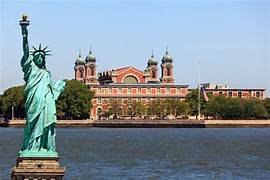Today's Immigration: America at the Crossroads
🌐 Immigration in the 21st Century
Immigration continues to shape the identity and future of the United States. In the 21st century, millions of people have arrived from Latin America, Asia, Africa, and the Middle East, seeking safety, opportunity, and a better life. These immigrants come through legal pathways — such as family sponsorship, employment visas, and refugee programs — while others arrive without authorization, often fleeing violence or economic desperation. Today, over 45 million foreign-born individuals live in the U.S., making up about 14% of the population and contributing to every sector of the economy.
🛂 Legal vs. Illegal Immigration
The American immigration system is complex and often difficult to navigate. Legal immigration includes green card holders, naturalized citizens, refugees, asylum seekers, and visa workers. Illegal or unauthorized immigration refers to those who enter the country without legal permission or overstay visas. As of recent estimates, there are over 10 million undocumented immigrants living in the U.S. This population is deeply woven into society, with many raising families, paying taxes, and working in vital industries such as agriculture, construction, and caregiving — yet they live in constant uncertainty and risk of deportation.
🧯Border Security and the Southern Border
The U.S.-Mexico border has become a central focus in the national immigration debate. Each year, thousands of migrants attempt to cross the border seeking asylum or economic opportunity. The surge has placed pressure on immigration enforcement agencies, border towns, and humanitarian organizations. Policies have shifted from administration to administration, ranging from stricter enforcement and border wall construction to expanded legal protections and processing centers. Border patrol agents and immigration courts are overwhelmed, leading to backlogs and delays in legal proceedings for asylum seekers and other migrants.
👶 DACA and Dreamers
One of the most discussed immigration issues today is the status of Dreamers — young people brought to the U.S. as children without legal status. The Deferred Action for Childhood Arrivals (DACA) program, introduced in 2012, allowed many of these individuals to work and study without fear of deportation. However, DACA remains in legal limbo, and Congress has not passed permanent protections. Over 600,000 DACA recipients — many of whom have never known another home — continue to live in uncertainty, hoping for a path to citizenship.
📜 Immigration Reform: A National Debate
Americans remain divided over how to handle immigration. Some advocate for strict enforcement, including deportations and tighter border control, while others call for compassionate reforms that provide a path to citizenship for law-abiding undocumented immigrants. Key reform proposals have included guest worker programs, expanded merit-based visas, border technology upgrades, and streamlining the legal immigration process. Despite years of debate, no major immigration legislation has passed since the early 2000s, leaving the system outdated and gridlocked.
🏛️ The Role of State and Local Governments
In the absence of sweeping federal reform, many states and cities have taken immigration matters into their own hands. Some have passed sanctuary policies to limit cooperation with federal immigration authorities. Others have taken a tougher stance, mandating E-Verify and increasing deportation efforts. These state-level decisions affect housing, education, healthcare, and local economies — and they reflect the diversity of views on immigration across the country.
📈 Economic and Social Contributions
Immigrants — both legal and undocumented — contribute significantly to the U.S. economy. They fill essential jobs, start businesses, serve in the military, and pay billions in taxes each year. Immigrant-led households play a key role in housing markets, entrepreneurship, and scientific innovation. Culturally, immigrants enrich American life through language, food, music, and community traditions. While challenges remain, the overall impact of immigration continues to strengthen the fabric of American society.
🇺🇸 Finding a Middle Ground
Immigration is not just a political issue — it's a human issue that affects families, communities, and the nation’s future. America has long been known as a land of opportunity and second chances, but today's immigration policies are often inconsistent and unclear. A balanced solution may require stronger border control, a fair path to legal status, protections for vulnerable groups, and a more modern system to meet labor and humanitarian needs. What happens next will define not only our immigration system — but also what kind of nation we choose to be.

